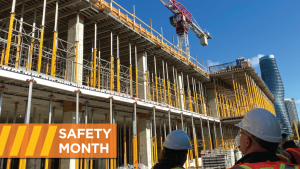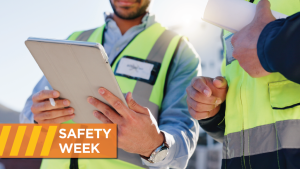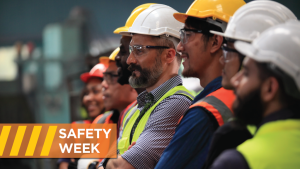Metrolinx is looking to become a leader in construction safety and is making some big changes in standards to get there.
That was the message delivered by George Bell, vice-president of safety and security at Metrolinx, during the Ontario General Contractors Association Leadership Conference and COR Open House held March 1 in Mississauga, Ont.
“When we say we want to get you there better, faster, easier, that’s not just about transportation, it’s also about construction,” explained Bell to the crowd of contractors.
“We also need to ask you to help us innovate, help us do things better, help do things differently, in terms of safety. Think forward all the time.
“We’ve gone from reporting on employee injuries to reporting on worker injuries, everyone who is involved in the delivery of our services and the creation of our system.”
He relayed a story about a worker on a construction site who had climbed onto formwork and although he was equipped with fall protection and had been trained, he neglected to use it. He fell 14 feet and got up and walked away uninjured.
“We went back to our partners. We realize that things like this happen and we are directing them to investigate this incident, this near miss or non-event, as if it were a fatality because only luck prevented that from happening,” said Bell.
“We are also looking at bringing in some different standards on our worksites. One of our partners once told me ‘we live by the Green Book, the Green Book is the golden standard.’ No it’s not. The Green Book is the basics, it’s the bottom standard. If I build a house in Ontario and I am complying with every element in the Ontario Building Code I just built the worst house I can legally build. We don’t want that, we want the best house we can build.”
Bell has been tasked with improving safety in the construction industry in Ontario, not just at Metrolinx.
We are doing this to protect lives and we are willing to pay for that
— George Bell
Metrolinx
“We are unashamedly using the hook that we are going to spend a lot of money and we only want to work with companies that are excellently safe. Companies that are excellently safe are also well managed and in general, are better partners,” Bell noted.
“One of the things that might be of interest to you is we have required COR certification for all major construction contracts. You must be COR certified. There is no wiggle room.”
The agency is also requesting companies show their lost time injury frequency rate for the last three years and they will take the average.
“We’ve got a tiering system that says how far from the industry norm are you and the farther away you are above the industry norm the less points you’re going to get,” said Bell.
“If you are below industry norm, we are going to give you more points on your bid. Underlying this is a big change in the way evaluate our RFPs. Previously, we had virtually no safety evaluation in our RFPs. More recently we moved that up to 20 per cent.”
The industry average for a major construction company in Ontario on lost time frequency is about 1.16 for 200,000 hours worked, explained Bell.
“Our goal that we are setting for our construction projects this year is 0.1. We think you can do it and we want to help you do it,” he said. “We have a very active contractor safety committee. Twenty of our largest construction contractors help advise us on these things. We are working hard with them to improve our standards and a lot of things about the way we operate.
“If you’re not safe, we’re not going to ask you to work for us.”
Coming soon, Metrolinx will also have a requirement in the safety section of bid submissions, stating companies will have to illustrate how to implement the hierarchy of controls for safety.
“If we go back to the incident where the gentleman fell, we would see that fall protection is the last line of defence. In this case it was applied as the first line of defence,” said Bell.
“What we would be looking to see, for example, can you use an elevated work platform, can you use staging, can you use something else. I understand that this is a change in the way we do business and I understand that there will be costs associated with this.
“We are doing this to protect lives and we are willing to pay for that. We also understand that when we have significant accidents in our workplaces it slows down our production, it makes us less efficient.”
Bell also said new fit for duty standards being implemented stipulate any worker found to be impaired on a Metrolinx site will not be allowed to work for Metrolinx again.
Metrolinx works hand in hand with Infrastructure Ontario, which has agreed to use the same standards as Metrolinx on large projects going forward, Bell added.











Recent Comments
comments for this post are closed